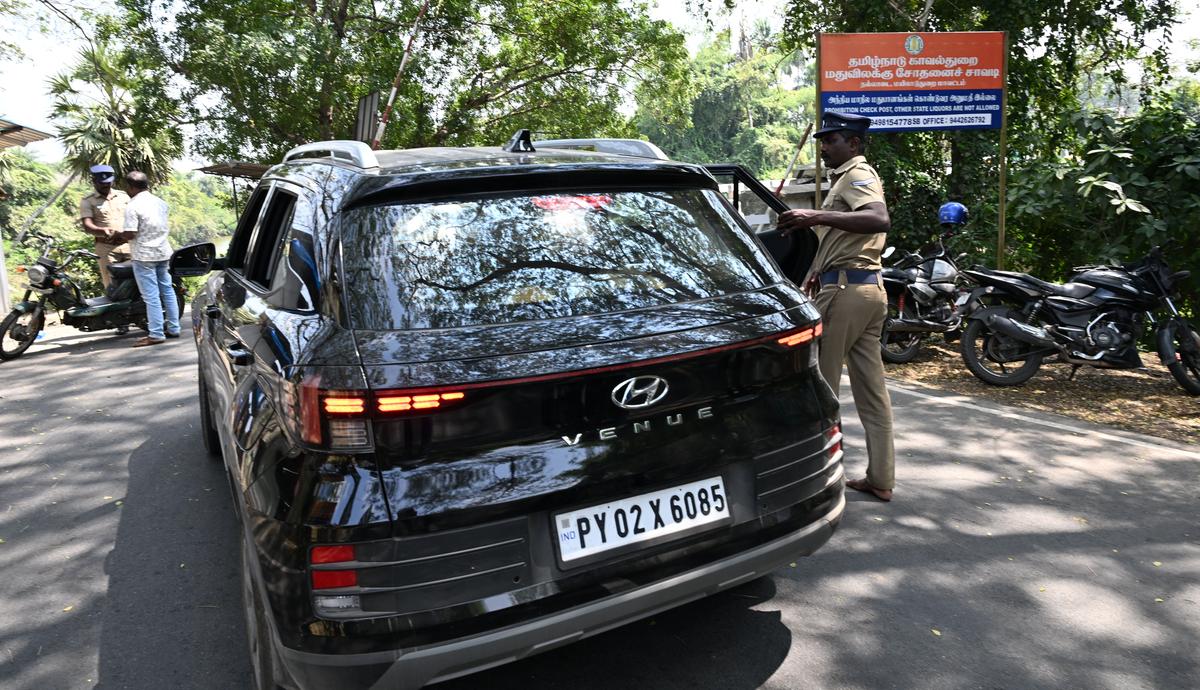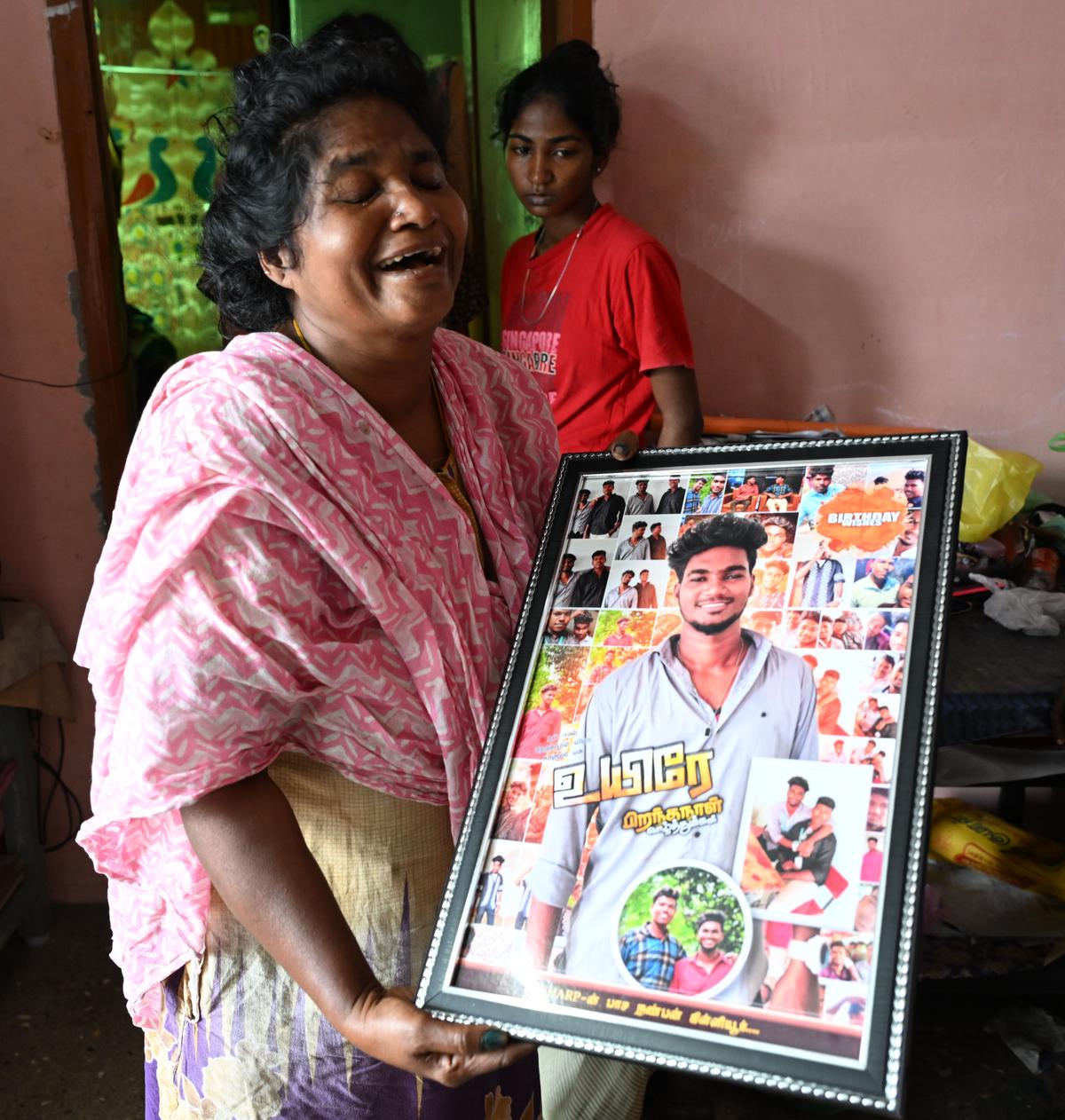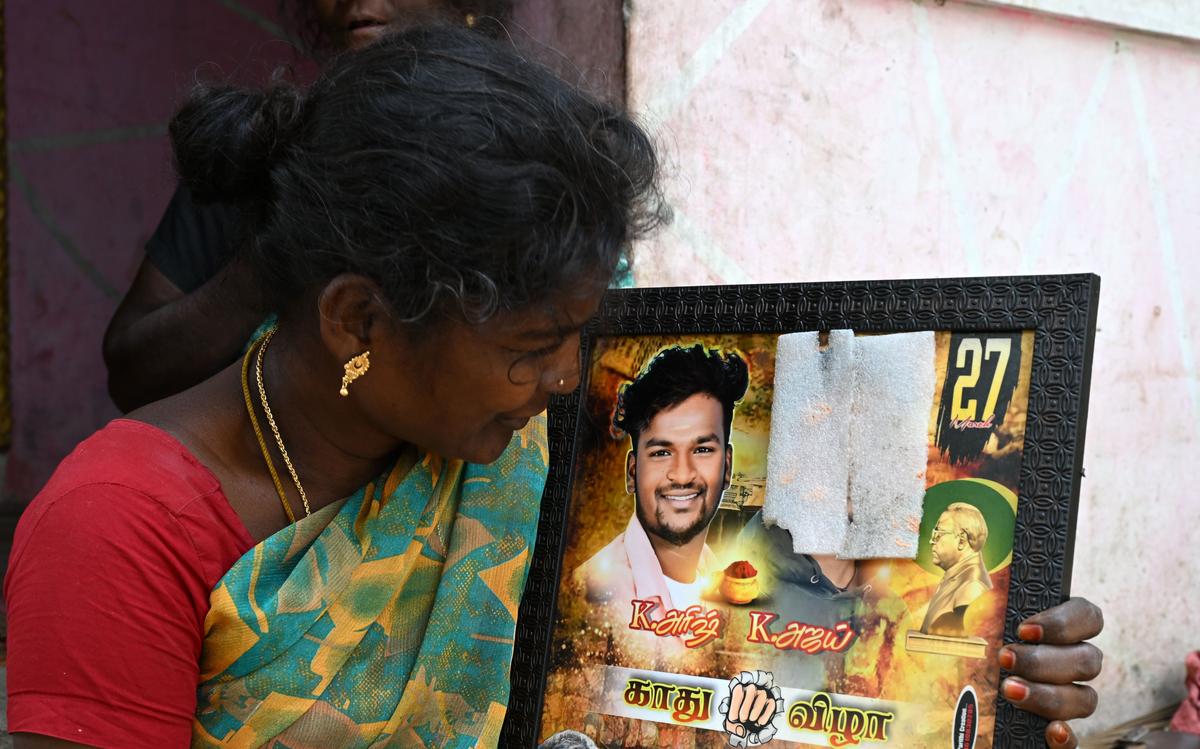Despite the Tamil Nadu government’s efforts to curb brewing and sale of illicit liquor, bootlegging continues to thrive in districts bordering Puducherry. In many cases, the trade has survived owing to lackadaisical police response and the significant difference between the prices of liquor in Tamil Nadu and the Union Territory. The State has again been forced to confront the consequences of failure to regulate bootlegging, after a double murder in Mayiladuthurai, where two 20-year-old youth were allegedly killed after villagers filed complaints against those involved in smuggling and selling of illicit liquor.
Around 7.30 p.m. on February 14, four friends — Dinesh; Ajay; Ajay’s elder brother K. Harish, 20; and B. Harisakthi, 20 — got together at the entrance of their street at Muttam, a village in the Agarakkeerangudi panchayat in the Perambur police station limits. The village is home to over 175 Dalit families and 25 families of other castes. Harish, who had completed his polytechnic education and was working in Chennai for the past few months, had come to the village on February 12 to visit his family. Harisakthi, a resident of the Pattamangalam panchayat, had arrived at Muttam that evening to spend time with relatives.
Also Read | Three arrested for killing two youths in Mayiladuthurai
Around the same time, another group arrived at the spot, allegedly in an inebriated condition. This group, which included Muvendan, 24; his elder brother Thangadurai, 28; and Rajkumar, 34, was armed with sharp weapons. Without provocation, they attacked the four friends. Harish sustained severe abdominal injuries, while Harisakthi was stabbed in the back. Ajay suffered hand injuries, and Dinesh escaped with minor wounds. Harish and Harisakthi were rushed to the Mayiladuthurai Government Hospital but died on the way.

The Nalladai checkpoint in the Perambur police limits of Mayiladuthurai district. It is located near the border of Puducherry. The police check the vehicles here to prevent the smuggling of illicit liquor from the Union Territory.
| Photo Credit:
M. Moorthy
R. Karikalachozhan, a relative of Harisakthi, said, “Our people were furious after our boys died. Around midnight, a crowd searched for Muvendhan’s family and Rajkumar, but they had fled by then. The residents damaged their houses.” A section of the residents staged a protest. The main accused — Muvendan, Thangadurai, and Rajkumar — were arrested on February 15. In the following days, the police arrested K. Sanjay, 22, for allegedly helping the accused persons evade arrest. They also arrested Muvendan’s parents, Munusamy and Manjula, for their alleged involvement in the crime. Residents claim Muvendan’s sister had been present at the scene, though her role remains unclear.
Also Read | Two more arrested in Mayiladuthurai double murder case
Disputed motive
There are claims and counter-claims, primarily about the reasons for the violence, about Harish’s age (which the police initially said was 25), and about the antecedents of those involved. Neither of the deceased had any criminal cases, according to their families and the police. In contrast, Rajkumar had been arrested on February 11 for selling illicit liquor and released on February 14, hours before the attack. Thangadurai faces two cases relating to illicit liquor trade, one filed in 2022 and the other in 2024.

B. Gowri, mother of Harisakthi.
| Photo Credit:
M. Moorthy
In Mayiladuthurai, the Perambur as well as Poraiyar police limits have checkpoints at Nalladai and Nandalar, bordering Karaikal in the Union Territory. A persistent problem here has been the smuggling of cheap liquor from Karaikal.
Also Read | Kin blame ‘illicit liquor trade’ as two youth murdered in Mayiladuthurai
Muttam residents say illegal liquor trade is rampant in their area, with alcohol smuggled from Karaikal being sold extensively. According to them, repeated complaints to the police prompted the accused persons to seek revenge. However, the district police denied any connection between the killings and illicit liquor sale. In a press statement issued on February 15, they said the murders were a sequel to a verbal altercation among individuals from the same locality.
The police said Muventhan had a dispute with Dinesh. On the evening of February 13, an argument broke out between the two and turned into a fight, prompting the residents to intervene. The police said that except Dinesh, the other victims had no enmity with the accused persons. The statement rejected claims linking the incident to liquor smuggling and urged the media to avoid spreading misinformation.

K. Rama, mother of Harish.
| Photo Credit:
M. Moorthy
Within two days of the murders, Perambur police station inspector Nagavalli and constable Prabhakaran were transferred and put on compulsory wait by Deputy Inspector-General of Police (Thanjavur Range) Ziaul Haque. Mayiladuthurai Superintendent of Police G. Stalin told The Hindu that initial inquiries pointed to personal enmity between Dinesh and the accused persons as the primary motive. However, as the investigation progresses, new details are emerging, and the police are open to considering all possible motives.
Families reject police version
Harisakthi, a third-year engineering student in Kumbakonam, was the eldest son of K. Balamurugan, a temple priest in a small village, and B. Gowri, a homemaker. His mother, struggling with unpaid college fees and house rent, described him as quiet and reserved. “At home, he would stay in his room or visit Muttam, where he had friends,” she said. “Liquor sales have been happening there for long. Though my son had never filed a complaint, the accused persons were suspicious of everyone. Past relationships mean nothing when profit is at stake.”
Harish’s mother, K. Rama, is part of the housekeeping staff at a local arts college. She earns ₹5,400 a month. Ms. Rama is distraught after losing her son. Her husband, C. Kalyanakumar, has been mostly unemployed for a decade owing to health issues. Their younger son, Ajay, 19, is the complainant in the case. “I worked tirelessly to educate my sons, hoping that Harish would change the fortunes of our family,” said Ms. Rama. “But now, I have lost him, and my purpose in life. The accused have harassed several families here for reporting illegal liquor sales. It is disheartening that the police are framing this as a case of personal enmity.”
On February 15, CPI(M) members staged a protest near the town bus stand, demanding the arrest of the Perambur inspector for allegedly shielding liquor smugglers. Party district committee member G. Stalin accused the police of acting under political pressure and downplaying the scale of liquor smuggling and sale. He pointed out that while the police initially attributed the murders to personal enmity, the sudden transfer of two officers raised suspicions.
He alleged that the police had leaked the identities of those who reported illicit liquor sales, leading to threats and attacks. Muttam, a predominantly farming village, has recorded an increase in first-generation college students, many of whom have opposed the liquor trade affecting their families. The CPI(M) claimed that a nexus between the police at the Puducherry border checkpoints and the Perambur station officers facilitated liquor smuggling.
During festivals like Thaipoosam, liquor smuggled from Karaikal floods the market. Unemployed youth exploit the price difference — liquor rates in Puducherry are nearly half of those in Tamil Nadu — turning smuggling into a profitable venture.
During a visit to Muttam and the Nalladai checkpost, which connects Mayiladuthurai and Puducherry, this correspondent observed a liquor shop, a bar, and a toddy shop, all operating on the border. With no residential settlements nearby, the location appears to be strategically placed to attract customers. Beyond the small bridge connecting Nalladai and Karaikal, there are vast stretches farmland and waterways that make smuggling easier.
Viduthalai Chiruthaigal Katchi’s regional organising secretary A. Velu Kubendran demanded compensation for the families of the victims and strict action against those responsible, including police officers. He said illicit liquor sales affected Dalit and working-class communities more.
In Puducherry, the price of a 60ml liquor bottle starts at ₹20, while a 180-ml quarter is available from ₹40. In contrast, in Tamil Nadu, the cheapest 180ml quarter of brandy costs ₹145. Additionally, Puducherry offers more varieties of liquor than Tamil Nadu. The significant price difference encourages a section of youth and traders to procure liquor and arrack from Puducherry and sell them in Tamil Nadu at higher prices. The problem is particularly rampant in districts bordering Puducherry and Karaikal.
Mr. Stalin, the Superintendent of Police, refuted claims made by protesters and political parties about the prevalence of illicit liquor sales at Muttam. He said some allegations were exaggerated, particularly those suggesting that multiple complaints had been filed. “While some allege that multiple complaints were filed regarding illicit liquor sales in the village, we have officially received only one complaint so far. The accused persons do not have multiple cases against them to be branded as professional liquor smugglers or sellers,” he said.
To curb liquor smuggling, measures were being taken to strengthen border security in key areas, he said. Additionally, as part of a community outreach programme, the police plan to conduct awareness camps in schools and colleges.
Political uproar
The murders sparked a political uproar, with parties criticising the DMK government for failing to check bootlegging and liquor smuggling. AIADMK general secretary Edappadi K. Palaniswami accused the government of fostering an environment wherein those making complaints were threatened or even killed.
Mr. Palaniswami also questioned the police’s preliminary statements attributing the murders to personal enmity and demanded a thorough probe.
BJP State president K. Annamalai blamed the murders on the sale of illicit liquor. “Illicit liquor is flowing like a river in Tamil Nadu. The State is going through a situation worse than the dark period of DMK rule between 2006 and 2011,” he wrote on social media.
PMK founder S. Ramadoss alleged that the police were trying to hide the truth and sought compensation for the affected families. CPI(M) State secretary P. Shanmugam rejected the police claims of personal enmity and said the murders were linked to liquor trade.
The police say they have maintained continuous vigil against illegal liquor. Till February 17, 2025, 208 cases were registered and 222 accused persons arrested in the district. A total of 2,531 litres of contraband was seized. In 2024, 3,547 cases were registered and 3,603 accused persons were arrested. A total of 74,975 litres of contraband was seized.
Lack of enforcement mechanism
A section of the police officers feels that the prohibition enforcement laws are outdated and ineffective in tackling the problem. Bail for those caught smuggling liquor is granted within two days. A person must have been caught with large quantities of liquor and remanded at least thrice to qualify for detention under the Goondas Act.
An officer of the Prohibition Enforcement Wing says, “Even if an individual is caught, he employs his brother or associate to continue the trade. This cycle keeps the illegal liquor flow uninterrupted.” The lack of stringent punishment and an enforcement mechanism allows smuggling to thrive, posing a challenge to the authorities trying to stamp out the menace.
Published – February 23, 2025 12:20 am IST




